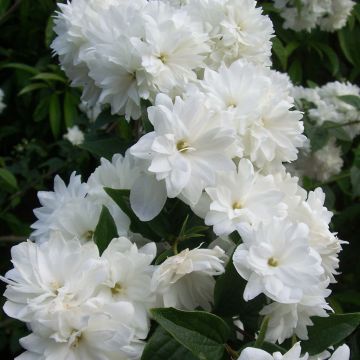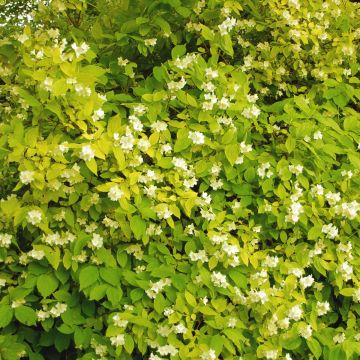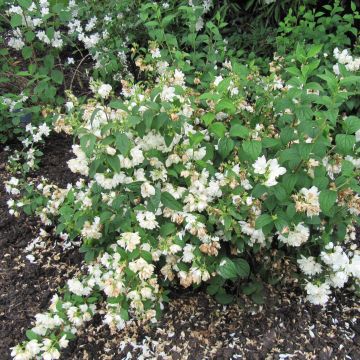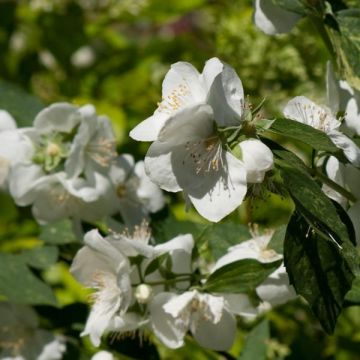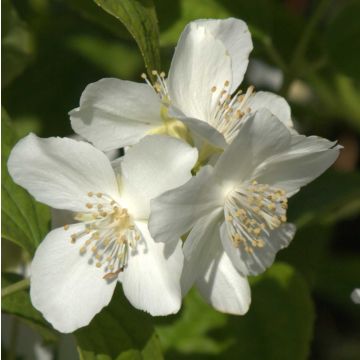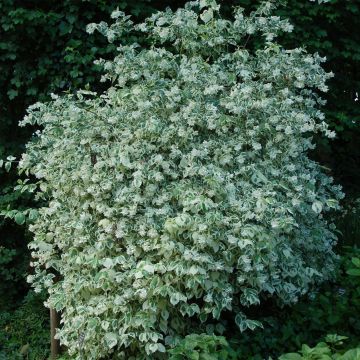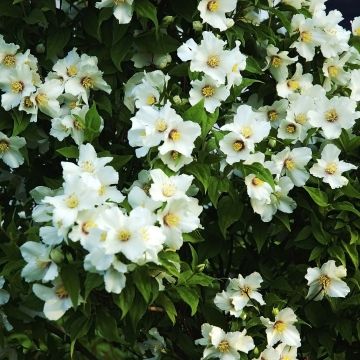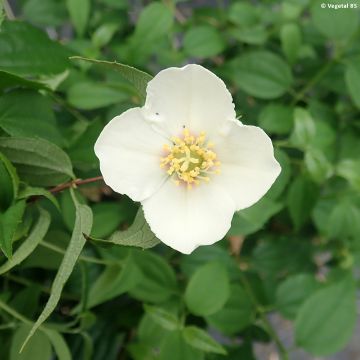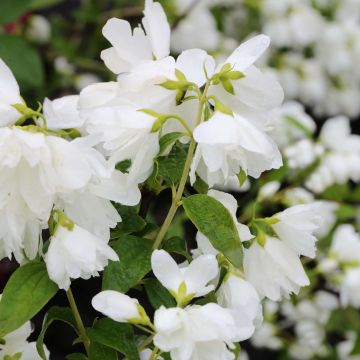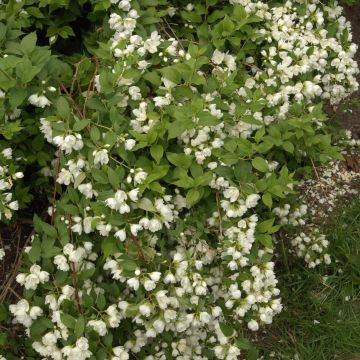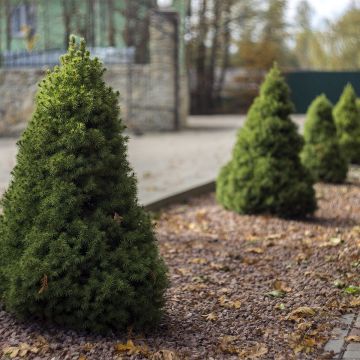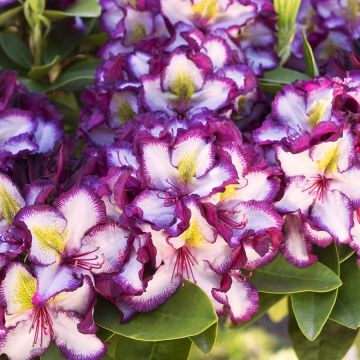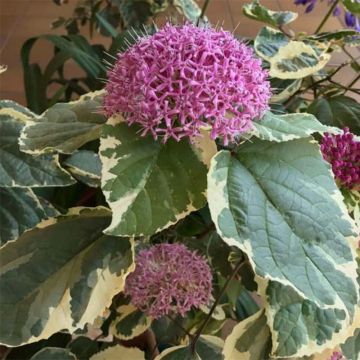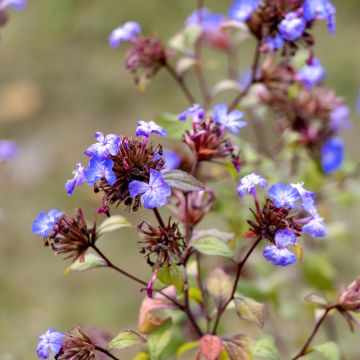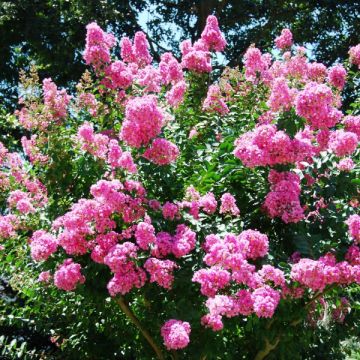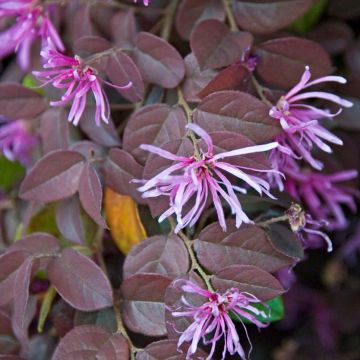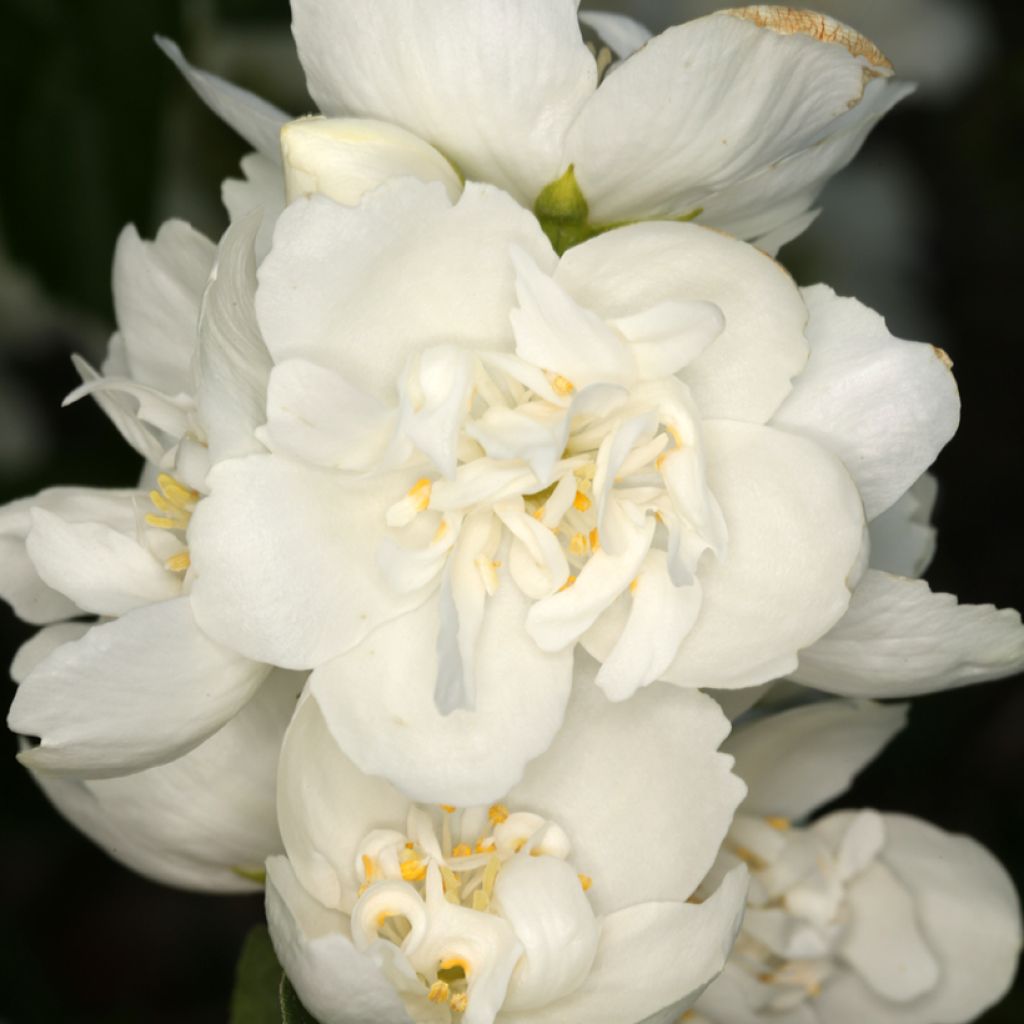

Philadelphus coronarius Justynka - Mock Orange
Philadelphus coronarius Justynka - Mock Orange
Philadelphus coronarius Justynka
Mock Orange, Sweet Mock Orange, English Dogwood
Special offer!
Receive a €20 voucher for any order over €90 (excluding delivery costs, credit notes, and plastic-free options)!
1- Add your favorite plants to your cart.
2- Once you have reached €90, confirm your order (you can even choose the delivery date!).
3- As soon as your order is shipped, you will receive an email containing your voucher code, valid for 3 months (90 days).
Your voucher is unique and can only be used once, for any order with a minimum value of €20, excluding delivery costs.
Can be combined with other current offers, non-divisible and non-refundable.
Home or relay delivery (depending on size and destination)
Schedule delivery date,
and select date in basket
This plant carries a 24 months recovery warranty
More information
We guarantee the quality of our plants for a full growing cycle, and will replace at our expense any plant that fails to recover under normal climatic and planting conditions.
Would this plant suit my garden?
Set up your Plantfit profile →
Description
The Philadelphus ‘Justynka’ is a variety of Seringat appreciated for its relatively compact habit, which allows it to be used in multiple situations, including in containers. In spring, the foliage of a fairly dark green serves as a backdrop for a superb semi-double white flowering, which exhales a very pleasant fragrance. An excellent beginner's plant, Philadelphus grows in a wide variety of soils, in full sun and even in partial shade. It is cold hardy, and its small size makes it easy to integrate into a diverse mix of shrubs and perennials. It is also very interesting for creating low hedges with a somewhat rustic appearance.
The genus Philadelphus belongs to the Hydrangeaceae family, which takes its name from Hydrangea in Latin, and includes other well-known ornamental genera such as Deutzia, or rarer ones, such as Kirengeshoma. There are about forty species of Philadelphus, shrubs from temperate regions of the Northern Hemisphere (Southern Europe and the Caucasus, Himalayas and eastern Asia, and North America). The cultivation of Seringats in our gardens is very ancient, dating back to before 1560 for P. coronarius, with other species being introduced over the centuries.
'Justynka' is a variety native to Poland, selected by breeder Antoni Wroblewski and introduced to the market in 1982. The bush forms a dense and spreading clump, forming at maturity a large irregular ball about 1.50 m in height and width. It is adorned with deciduous foliage, medium to dark green in colour, consisting of simple leaves with toothed margins, ovate to elliptical, measuring 4 to 6 cm long and 2.5 to 4 cm wide. This rather dark vegetation is perfect for showcasing the superb white spring flowering. Flowers of 3 to 4 cm in diameter, grouped in clusters, then form bouquets along the branches. Semi-double, more or less open cup-shaped, the flowers are pleasantly fragrant and release their scent in the garden for several weeks, with flowering usually occurring from May to June.
Seringats, sometimes also called Poet's Jasmine because of their sweet fragrance, are among the easiest shrubs to grow. This 'Justynka' variety has the advantage of a compact habit that allows it to be grown in containers. In the garden, it will be perfect in a mixed border, alongside plants that are just as easy to grow. Plant at its feet the Potentilla fruticosa 'Red Ace', a low shrubby Cinquefoil, which will form a cushion 50 cm tall and almost double in spread, and will offer you a simple red-orange flowering from June to September. The Double Play Big Bang Japanese Spirea combines the attraction of foliage with changing colours, ranging from orange-red to yellow and then green, to yellow again in autumn, and a pretty pink flowering throughout the summer. To celebrate the arrival of spring and thus extend the flowering period of your border, add a Forsythia x intermedia 'Week-end' that will give you an explosion of yellow flowers in March-April. And for autumn, nothing beats an Oakleaf Hydrangea 'Snowcicle', a high-impact plant that does not require heather soil to thrive and will reward you with large double panicles of cream-white flowers that later take on pink-red hues. In addition to its very long flowering period, from July to October, this easy-to-grow Hydrangea will offer you a colourful spectacle in autumn when its beautiful cut foliage turns red.
Report an error about the product description
Plant habit
Flowering
Foliage
Botanical data
Philadelphus
coronarius
Justynka
Hydrangeaceae
Mock Orange, Sweet Mock Orange, English Dogwood
Cultivar or hybrid
Other Philadelphus - Mock Orange
View all →Planting and care
Philadelphus 'Justynka' is very easy to grow, requires very little maintenance and is very adaptable. It is well suited to all gardens and is ideal for beginners. It thrives in ordinary, poor, even chalky soil that is not too dry to cool. However, it prefers cool, well-drained, moist soil. It is very hardy, tolerating temperatures as low as -20°C or even colder. It should be planted in early spring or autumn, in sun or part-shade. Since it flowers on the previous year's shoots, Philadelphus should be pruned after flowering, in July-August, by cutting back the flowering branches by a third of their length. More severe pruning can be carried out every 2 or 3 years, to keep it compact and full of flowers. All you have to do is cut back the old wood and any branches that are too long, right down to the base of the plant, to encourage it to branch out. A hardy shrub, it can nevertheless be prone to powdery mildew and black aphids.
Planting period
Intended location
Care
This item has not been reviewed yet - be the first to leave a review about it.
Similar products
Haven't found what you were looking for?
Hardiness is the lowest winter temperature a plant can endure without suffering serious damage or even dying. However, hardiness is affected by location (a sheltered area, such as a patio), protection (winter cover) and soil type (hardiness is improved by well-drained soil).

Photo Sharing Terms & Conditions
In order to encourage gardeners to interact and share their experiences, Promesse de fleurs offers various media enabling content to be uploaded onto its Site - in particular via the ‘Photo sharing’ module.
The User agrees to refrain from:
- Posting any content that is illegal, prejudicial, insulting, racist, inciteful to hatred, revisionist, contrary to public decency, that infringes on privacy or on the privacy rights of third parties, in particular the publicity rights of persons and goods, intellectual property rights, or the right to privacy.
- Submitting content on behalf of a third party;
- Impersonate the identity of a third party and/or publish any personal information about a third party;
In general, the User undertakes to refrain from any unethical behaviour.
All Content (in particular text, comments, files, images, photos, videos, creative works, etc.), which may be subject to property or intellectual property rights, image or other private rights, shall remain the property of the User, subject to the limited rights granted by the terms of the licence granted by Promesse de fleurs as stated below. Users are at liberty to publish or not to publish such Content on the Site, notably via the ‘Photo Sharing’ facility, and accept that this Content shall be made public and freely accessible, notably on the Internet.
Users further acknowledge, undertake to have ,and guarantee that they hold all necessary rights and permissions to publish such material on the Site, in particular with regard to the legislation in force pertaining to any privacy, property, intellectual property, image, or contractual rights, or rights of any other nature. By publishing such Content on the Site, Users acknowledge accepting full liability as publishers of the Content within the meaning of the law, and grant Promesse de fleurs, free of charge, an inclusive, worldwide licence for the said Content for the entire duration of its publication, including all reproduction, representation, up/downloading, displaying, performing, transmission, and storage rights.
Users also grant permission for their name to be linked to the Content and accept that this link may not always be made available.
By engaging in posting material, Users consent to their Content becoming automatically accessible on the Internet, in particular on other sites and/or blogs and/or web pages of the Promesse de fleurs site, including in particular social pages and the Promesse de fleurs catalogue.
Users may secure the removal of entrusted content free of charge by issuing a simple request via our contact form.
The flowering period indicated on our website applies to countries and regions located in USDA zone 8 (France, the United Kingdom, Ireland, the Netherlands, etc.)
It will vary according to where you live:
- In zones 9 to 10 (Italy, Spain, Greece, etc.), flowering will occur about 2 to 4 weeks earlier.
- In zones 6 to 7 (Germany, Poland, Slovenia, and lower mountainous regions), flowering will be delayed by 2 to 3 weeks.
- In zone 5 (Central Europe, Scandinavia), blooming will be delayed by 3 to 5 weeks.
In temperate climates, pruning of spring-flowering shrubs (forsythia, spireas, etc.) should be done just after flowering.
Pruning of summer-flowering shrubs (Indian Lilac, Perovskia, etc.) can be done in winter or spring.
In cold regions as well as with frost-sensitive plants, avoid pruning too early when severe frosts may still occur.
The planting period indicated on our website applies to countries and regions located in USDA zone 8 (France, United Kingdom, Ireland, Netherlands).
It will vary according to where you live:
- In Mediterranean zones (Marseille, Madrid, Milan, etc.), autumn and winter are the best planting periods.
- In continental zones (Strasbourg, Munich, Vienna, etc.), delay planting by 2 to 3 weeks in spring and bring it forward by 2 to 4 weeks in autumn.
- In mountainous regions (the Alps, Pyrenees, Carpathians, etc.), it is best to plant in late spring (May-June) or late summer (August-September).
The harvesting period indicated on our website applies to countries and regions in USDA zone 8 (France, England, Ireland, the Netherlands).
In colder areas (Scandinavia, Poland, Austria...) fruit and vegetable harvests are likely to be delayed by 3-4 weeks.
In warmer areas (Italy, Spain, Greece, etc.), harvesting will probably take place earlier, depending on weather conditions.
The sowing periods indicated on our website apply to countries and regions within USDA Zone 8 (France, UK, Ireland, Netherlands).
In colder areas (Scandinavia, Poland, Austria...), delay any outdoor sowing by 3-4 weeks, or sow under glass.
In warmer climes (Italy, Spain, Greece, etc.), bring outdoor sowing forward by a few weeks.






























